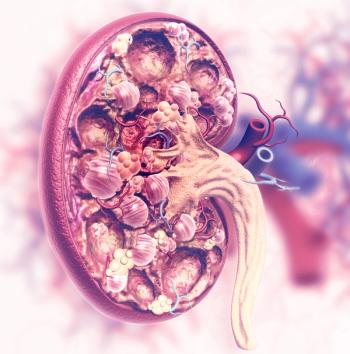Conference Coverage
about 19 hours ago
2026 Tandem Meetings: What’s the Latest Research in Multiple Myeloma?about 20 hours ago
Tandem Meetings Recap: T-Cell Efficacy and Safety Updates in Lymphomaabout 21 hours ago
Theranostics in Radiation Oncology: What is it and Why is it Important?about 22 hours ago
Allogeneic Transplantation Yields Long-Term Survival in ALL PopulationTrending on CancerNetwork
Modifiable Risk Factors Suggest Potential for Improving Cancer Prevention
2026 Tandem Meetings: What’s the Latest Research in Multiple Myeloma?
Barriers to CAR T-Cell Referral and Center Access in Multiple Myeloma
Dato-DXd Receives Priority Review in Unresectable/Metastatic TNBC
Real World Outcomes of CAR T-Cell Therapy in Multiple Myeloma Including Older and Comorbid Patients
Latest News
Shorts










Podcasts

How to Responsibly Use AI in Palliative Care and Hematologic Malignancies
In palliative care, AI may serve as a supportive tool rather than a replacement of clinical judgment, said Ram Prakash Thirugnanasambandam, MBBS.

Screening, Prevention, and Intervention on Cervical Cancer Awareness Month
Experts discuss new modalities such as HPV vaccines, balancing hope with realism, and other considerations in cervical cancer management.

Innovation, Elevation, and Empowerment Through Integrative Care in Oncology
Nathan Goodyear, MD, discussed key insights in integrative oncology care as well as evidence-based, patient-centric tools that may optimize QOL outcomes.

Decoding the Top Moments in Prostate Cancer Management From 2025
Experts cover the regulatory approvals and clinical trial readouts from 2025 that may move the needle for prostate cancer management.

Taking the First Steps Beyond the Starting Line With RadOnc on the Run
Host Brandon Mancini, MD, MBA, FACRO, introduces a special podcast series focused on delivering key insights and takeaways in the radiation oncology space.

How Can Bioimpedance Spectroscopy Help Detect Lymphedema More Quickly?
Experts from VCU Massey Cancer Center discuss seamlessly integrating bioimpedance spectroscopy into standard workflows for lymphedema detection.

Bolstering Outcomes and Building Bridges in Integrative Oncology Care
Opening dialogue and establishing connections across different oncology camps may enhance the use of integrative modalities and bolster patient outcomes.

What Were the Key Kidney and Bladder Cancer Advances in 2025?
Experts break down the clinical trial data and regulatory developments that made 2025 a “remarkable year” in kidney and bladder cancer management.

Advancing Research and Combating Disparities in Pancreatic Cancer Care
Jose G. Trevino II, MD, FACS, emphasized educating patients and physicians alike to help recognize early signs of pancreatic ductal adenocarcinoma.

What’s New in Hematology/Oncology? Discussing the 2025 ASH Annual Meeting
Rahul Banerjee, MD, FACP; and Brooke Adams, PharmD, BCOP, discussed the top hematologic oncology abstracts from the 2025 ASH Annual Meeting and Exposition.
Videos
Continuing Medical Education
All News

Kathie-Ann Joseph, MD, MPH, FACS, described the clinical criteria for nipple-sparing mastectomies and oncoplastic surgery, focusing on tumor-to-nipple distance and oncologic safety for breast cancer patients.

Based on the prevalence of GLP-1 agonists employed in standard medical practice, Li’s team will assess their impact on radiotherapy for prostate cancer.

Loaiza-Bonilla anticipates that AI-assisted EKG models could be cleared for use in risk stratification for receipt of surgery or drug use.

Theranostics is an escalating field within radiation oncology and clinicians should be utilizing it every day, according to Brandon Mancini, MD, MBA, FACRO.

J. Isabelle Choi, MD, outlined evidence-based strategies for radiation dose escalation in locoregionally advanced breast cancer.

No serious adverse effects were observed with TRX103 in patients with hematologic malignancies undergoing HLA-mismatched HCT.

Prior phase 1 data support the fast track designation for pelareorep as a treatment for those with KRAS-mutated microsatellite stable colorectal cancer.

Ifeoma Dikeocha, PhD, discussed how metabolic restriction and fasting-mimicking diets can help optimize chemotherapy outcomes in breast cancer.

Over the past 10 years, more barriers have become apparent in the process of getting insurance companies to approve cancer treatments, according to Loretta Nastoupil, MD.

Global analysis data reveal that lung, stomach, and cervical cancers represent approximately half of preventable cancers.

Of 78 patients with NMIBC in the phase 2 clinical trial, 64.4% experienced a complete response with TLD-1433.

Research may support the development of more comprehensive risk-stratification models accounting for different tumor-intrinsic factors.

Findings from a phase 2 study demonstrate the feasibility of conducting genomically driven trials among patients with meningiomas.

Ifeoma Dikeocha, PhD candidate, explains why triple-negative breast cancer is uniquely sensitive to fasting mimicking diets.

Deb Schrag, MD, MPH, will assume the role as ASCO president in 2027, and hopes to continue the work of transcending global, political, and geographic barriers in oncology.

Although institutional cancer centers boast large amounts of resources, community centers do not always have the resources to initiate clinical trials, according to Loretta Nastoupil, MD.

A PDUFA date in the second quarter of 2026 has been set for Dato-DXd in patients with unresectable or metastatic TNBC.

A phase 1/2 trial will evaluate N17350 in patients with pretreated, advanced solid tumors, such as head and neck neoplasms, NSCLC, and melanoma, among others.

Phase 1 QUILT-3.002 data showed that combining an IL-15 superagonist with rituximab achieved a 78% CR rate in those with rituximab-refractory disease.

No differences in complication rate were observed between the MIXREAL and control groups among those treated for kidney cancer in the REALITATEM trial.

Infusing chemoimmunotherapy earlier in the day also correlated with improvements in responses among patients with NSCLC in a phase 3 trial.

A biologics license application is planned to be sent to the FDA for OST-HER2 in recurrent, fully resected, pulmonary metastatic osteosarcoma.

Potential FDA approval of teclistamab plus daratumumab may offer another option in the multiple myeloma armamentarium, said Surbhi Sidana, MD.

The consolidation of oncologists and the transition to bispecific antibodies and CAR T-cell therapies are among factors that have led to increasing cancer care costs.

Treatment with zanzalintinib plus atezolizumab led to improvements in OS and PFS vs regorafenib alone in patients with metastatic colorectal cancer.

CancerNetwork spoke with Arturo Loaiza-Bonilla, MD, MSEd, FACP, regarding his insights about recent advancements for AI in oncology.

Additional translational research may help inform the design of next-generation therapies for patients with multiple myeloma, said Manoj Bhasin, PhD, MS.

Real-world data presented at the 36th Annual IPCU build upon findings from the phase 3 TITAN trial evaluating apalutamide in this CSPC population.

Rivoceranib plus camrelizumab achieved a median OS of 23.8 months vs 15.2 months with sorafenib alone in patients with unresectable hepatocellular carcinoma.

IFx-2.0 showed a clinical benefit in an early phase 1 trial and has now been given orphan drug designation by the FDA for patients with stage IIB to IV cutaneous melanoma.

In palliative care, AI may serve as a supportive tool rather than a replacement of clinical judgment, said Ram Prakash Thirugnanasambandam, MBBS.

According to investigators of the phase 3 SCOT trial, most patients with colon and rectal cancer should be receiving only 3 months of adjuvant treatment.

Artificial intelligence may be used in CT scans to help detect early-stage disease in at-risk patients undergoing screening for cancer.






















































